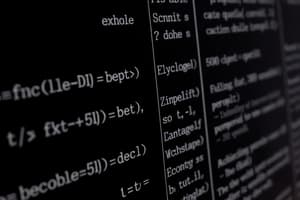Podcast
Questions and Answers
Which type of logic is discussed in Chapter 7?
Which type of logic is discussed in Chapter 7?
- Fuzzy logic
- Predicate logic
- Propositional logic (correct)
- Modal logic
What is a knowledge base?
What is a knowledge base?
- A set of axioms
- A set of algorithms
- A set of sentences in a formal language (correct)
- A set of logical rules
At which level can agents be viewed?
At which level can agents be viewed?
- Both knowledge and implementation levels (correct)
- Implementation level
- Knowledge level
- Neither knowledge nor implementation levels
What does the KB-Agent function return?
What does the KB-Agent function return?
What does the counter 't' in the KB-Agent function indicate?
What does the counter 't' in the KB-Agent function indicate?
Which type of inference engine is used in knowledge-based agents?
Which type of inference engine is used in knowledge-based agents?
What is the purpose of the counter 't' in the KB-Agent function?
What is the purpose of the counter 't' in the KB-Agent function?
What is the declarative approach to building an agent?
What is the declarative approach to building an agent?
What is the purpose of the Make-Percept-Sentence function in the KB-Agent function?
What is the purpose of the Make-Percept-Sentence function in the KB-Agent function?
What is the main focus of Chapter 7 in the text?
What is the main focus of Chapter 7 in the text?
Flashcards are hidden until you start studying
Study Notes
Chapter 7: Knowledge-Based Agents
- The type of logic discussed in Chapter 7 is knowledge-based logic.
Knowledge Base and Agent Levels
- A knowledge base is a repository of knowledge that an agent uses to reason and make decisions.
- Agents can be viewed at the knowledge level, which focuses on the agent's knowledge and how it is used to make decisions.
KB-Agent Function
- The KB-Agent function returns a set of sentences that can be inferred from the knowledge base.
- The counter 't' in the KB-Agent function indicates the current time step.
Inference Engine and Purpose of 't'
- A forward-chaining inference engine is used in knowledge-based agents.
- The purpose of the counter 't' is to keep track of the current time step in the agent's reasoning process.
Declarative Approach and Make-Percept-Sentence Function
- The declarative approach to building an agent involves specifying what the agent should know and how it should reason with that knowledge.
- The Make-Percept-Sentence function is used to create a sentence that represents the agent's current perception.
Chapter 7 Focus
- The main focus of Chapter 7 is knowledge-based agents and how they use knowledge to reason and make decisions.
Studying That Suits You
Use AI to generate personalized quizzes and flashcards to suit your learning preferences.




